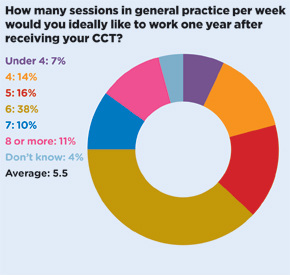GP trainees want to work 5.5 sessions a week in general practice
Exclusive GP trainees are set to work fewer sessions than the eight previously considered full time, Pulse’s survey of trainees has revealed.
The survey of 280 GP trainees revealed that only one in ten were willing to work eight sessions a week in practice, with a further one in ten willing to work seven.
Trainees said that this was due to the increased intensity of a session, and cited the burnout suffered by many current GPs.
This comes after Health Education England chief executive Professor Ian Cumming claimed that ‘millennials are increasingly not wanting to work’ the same hours as previous generations.
The survey also revealed that one-third of trainees cited work-life balance as the main reason they entered the profession, with a further third citing the ability to pursue a portfolio career and have flexibility and control over working hours.
The survey found that the average GP trainee wanted to work 5.5 sessions a week, with 38% saying they wanted to work a six-session week.
Many respondents said that they wanted to do work outside the practice.
Dr Zoe Greaves, a GPST1 in north-east England, said: ‘I enjoy clinical work, but have seen colleagues burn out doing it five days a week. I feel more challenged and engaged with my work when I have variety to my week, and am passionate about improving and developing the way we deliver services.’
Professor Ian Cumming told delegates at the NHS Confederation conference in June that full-time equivalent (FTE) GP numbers were down because ‘Generation Y and Z and millennials are increasingly not wanting to work the same number of hours that many of the baby boomers and Generation X want to work’.
However, Dr Jason Sarfo-Annin, a GPST1 in Bristol, said that Professor Cumming displayed a ‘lack of awareness to changes regarding the effect of the work environment on junior doctors career aspirations’.
He said: ‘The current generation has seen the incentives for loyalty slowly being eroded (loss of final-salary pension, removal of increments from new junior doctors contract, below inflation pay rises etc) and have very little flexibility in where, how and when they can work due to the structure of medical training in the UK.’
Dr Sarfo-Annin said that the fact that work-life balance and flexibility were chosen by many as their motivation for entering general practice ‘are arguably symptomatic of the fact that these doctors don’t like the training environment across medicine broadly that has been present during the last 10 years. To coin a phrase want to “take back control” of how they work and that’s easier to do as a GP than as a hospital consultant’.

sessions per week after cct piechart 290x275px

why you chose gen prac piechart 290x275px
Source: The survey was launched on 30 June, collecting responses using the SurveyMonkey tool. The 18 questions asked covered a wide range of GP trainee topics, to avoid selection bias on one issue. The survey was advertised to readers via our website and email newsletter, with a prize draw for £200 worth of pizza as an incentive to complete the survey. A total of 280 GP trainees answered these questions









